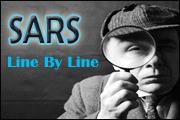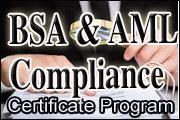What Is The BSA?The Bank Secrecy Act (BSA) is designed to detect and prevent money laundering and other financial crimes, including terrorist financing. The Act imposes certain requirements on financial institutions to help law enforcement agencies combat these illicit activities.
To ensure BSA compliance, all financial institutions must submit or keep on file a variety of documents such as currency transaction reports (CTRs), suspicious activity reports (SARs) and Foreign Bank Account Reports (FBARs). These reports pertain to the types of transactions that are most likely to indicate money laundering activities. The penalties for failing to file the reports or comply with other Bank Secrecy Act requirements range from significant fines to imprisonment.What Are The Key BSA Requirements?The Bank Secrecy Act imposes various requirements on financial institutions and helps prevent money laundering, terrorist financing, and other financial crimes. Key BSA requirements include:- Currency Transaction Reporting (CTR):
Financial institutions must file a Currency Transaction Report for each transaction involving more than $10,000 in currency, cash, or certain monetary instruments. This helps track large cash transactions. - Suspicious Activity Reporting (SAR):
Financial institutions are required to report suspicious transactions that may indicate money laundering or other illicit activities. This includes transactions that are unusual for the customer or inconsistent with their known patterns of activity. - Customer Identification Program (CIP):
Financial institutions must establish and maintain a written Customer Identification Program to verify the identity of customers opening accounts. This involves collecting certain information and verifying it through reliable sources. - Know Your Customer (KYC):
Similar to CIP, KYC requirements mandate that financial institutions have procedures in place to understand the nature of their customers' businesses, the source of their funds, and the expected transactions. - AML Compliance Program:
Financial institutions must develop and maintain a comprehensive Anti-Money Laundering (AML) compliance program. This includes policies, procedures, and controls to detect and prevent money laundering and terrorist financing activities. - Recordkeeping Requirements:
BSA requires financial institutions to maintain records of certain transactions and customer information. This includes CTRs, SARs, and records related to CIP and KYC. - Reporting of Foreign Bank and Financial Accounts (FBAR):
U.S. persons with financial interest or signature authority over foreign financial accounts exceeding certain thresholds must report these accounts annually to the IRS. - Beneficial Ownership Reporting (BO Reporting):
Financial institutions must collect and report information about the beneficial owners of legal entity customers to help prevent the use of shell companies for illicit purposes.
These requirements help ensure transparency in financial transactions, deter illicit activities, and assist law enforcement agencies in investigating and prosecuting financial crimes. Compliance with BSA requirements is monitored and enforced by various regulatory agencies, including the Financial Crimes Enforcement Network (FinCEN) in the United States.What Are Common Errors Regarding BSA Compliance?BSA (Bank Secrecy Act) compliance errors can have serious consequences for financial institutions, including regulatory fines and reputational damage. Some common errors include:- Failure to File Currency Transaction Reports (CTRs):
Financial institutions are required to file CTRs for cash transactions exceeding $10,000 in a single business day. Failure to file or filing inaccurately can result in penalties. - Inadequate Customer Due Diligence (CDD):
Financial institutions must conduct proper due diligence on their customers to assess the risk of money laundering or terrorist financing. This includes verifying customer identities, understanding the nature of their business, and monitoring account activity. Errors can occur if CDD processes are not thorough or up to date. - Lack of Suspicious Activity Monitoring:
Institutions are required to monitor customer transactions for potentially suspicious activity and file Suspicious Activity Reports (SARs) when necessary. Errors can occur if monitoring systems are not effectively implemented or if staff are not adequately trained to recognize suspicious patterns. - Incomplete or Inaccurate Reporting:
Reporting errors can occur when filing required reports such as CTRs or SARs. This might include missing information, inaccuracies in transaction details, or failure to report transactions that meet reporting thresholds. - Weak Internal Controls:
Failure to establish and maintain adequate internal controls can lead to compliance errors. This includes insufficient segregation of duties, lack of oversight, and ineffective policies and procedures.  - Insufficient Training and Awareness:
Employees need to be properly trained on BSA requirements and aware of their responsibilities in detecting and reporting suspicious activity. Failure to provide adequate training can result in compliance lapses. - Inadequate Recordkeeping:
Proper recordkeeping is essential for BSA compliance. Errors can occur if records are incomplete, inaccurate, or not retained for the required period. - Failure to Conduct Independent Audits:
Regular independent audits are necessary to assess the effectiveness of a financial institution's BSA compliance program. Errors can occur if audits are not conducted or if findings are not addressed promptly. - Non-compliance with Beneficial Ownership Requirements:
Financial institutions must identify and verify the beneficial owners of legal entity customers. Failure to comply with these requirements can lead to compliance errors. - Failure to Stay Updated on Regulatory Changes:
BSA regulations and requirements can change over time. Failure to stay updated on these changes can result in compliance errors. Regularly reviewing and updating compliance programs is essential to mitigate this risk.
Financial institutions must be vigilant in addressing these common errors to maintain effective BSA compliance programs and avoid regulatory scrutiny.What You'll Learn From Our BSA Compliance Training CoursesOur comprehensive Bank Secrecy Act certification training courses cover everything you need to know to execute the job of the BSA Officer effectively and efficiently. Our BSA banking courses provide bank secrecy act training covering BSA regulations, Bank Secrecy Act requirements, the BSA reporting requirements, and other Bank Secrecy Act compliance requirements, including:- Red Flags for money laundering
- Definitions and building blocks for your BSA policy
- When it says "policy", "procedure", or "process" in the exam manual - what is the difference?
- Things that are exam hotspots in your policy
- What is the Board involvement in your policy? Why are somethings better in procedures than in the policy?
- Using the FFIEC exam manual to guide you through the process

- Wires and monetary instrument recordkeeping rules
- Customer Identification Rules
- Internal Audit requirements
- Risk assessing your BSA Officer
- How to keep risk fluid in your organization
- Customer Identification Programs - changing and evolving your program
- Customer Due Diligence and High Risk Customers
- Nonresident alien accounts and W-8BENs
- Training requirements and things you might not know
Find BSA Compliance Training CoursesTo find your desired BSA compliance training courses, either select a Recommended Course from the list below, or select "BSA" and your state from the "Professional Development" section of the search box at the bottom of this page. |
Training For The BSA Regulations And Your BSA Compliance NeedsHow To Become A BSA OfficerAs part of their compliance efforts, every financial institution must also have a designated BSA Officer. Typically appointed to the role by the board of directors, this is a high-level individual with extensive knowledge of the Act and can communicate with examiners and regulators regarding the status of the institution's compliance initiatives. Timely, relevant Bank Secrecy Act training is essential for anyone that holds or is seeking to fulfill this crucial role. Why Choose Bank Training Center For Your Bank Secrecy Act Compliance Training Needs?TrainingCenter has been helping professionals in industries such as banking, insurance, finance, real estate and accounting meet their training, certification and licensing requirements since 1994. Here at BankTrainingCenter.com, we focus on providing timely, relevant educational resources regarding the most relevant and timely banking industry topics. We offer multiple ways to meet your training requirements, including online courses and webinars, in-person seminars and offline publications — we make it easy to find a format that suits your learning preferences. Whether your goal is to meet compliance requirements or engage in training to boost your knowledge and enhance your career, you'll find the right program for your needs. Feel free to contact us if you have questions about any of our Bank Secrecy Act training courses. Recommended BSA Training CoursesThe Bank Training Center offers numerous BSA banking, BSA compliance, and other bank training courses. Below are a few of our best-selling BSA banking courses: - BSA Requirements
This course will introduce you to the fundamental Bank Secrecy Act requirements that every BSA officer needs to know. You'll become familiar with the Act and learn about the various CTR and SAR documentation and filing requirements. You'll also learn how to implement a strong Customer Identification Program (CIP) and gain an understanding of the relationship between the BSA and the USA PATRIOT Act. - BSA for the Frontline
Regarded as the most crucial annual Bank Secrecy Act training initiative in years, this program covers the new BSA Customer Due Diligence rules that directly impact tellers, loan officers and other frontline bank employees. Not just for BSA officers, this training can benefit any employee who interacts with customers. You'll learn how to identify the red flags that indicate money laundering and much more.
|





